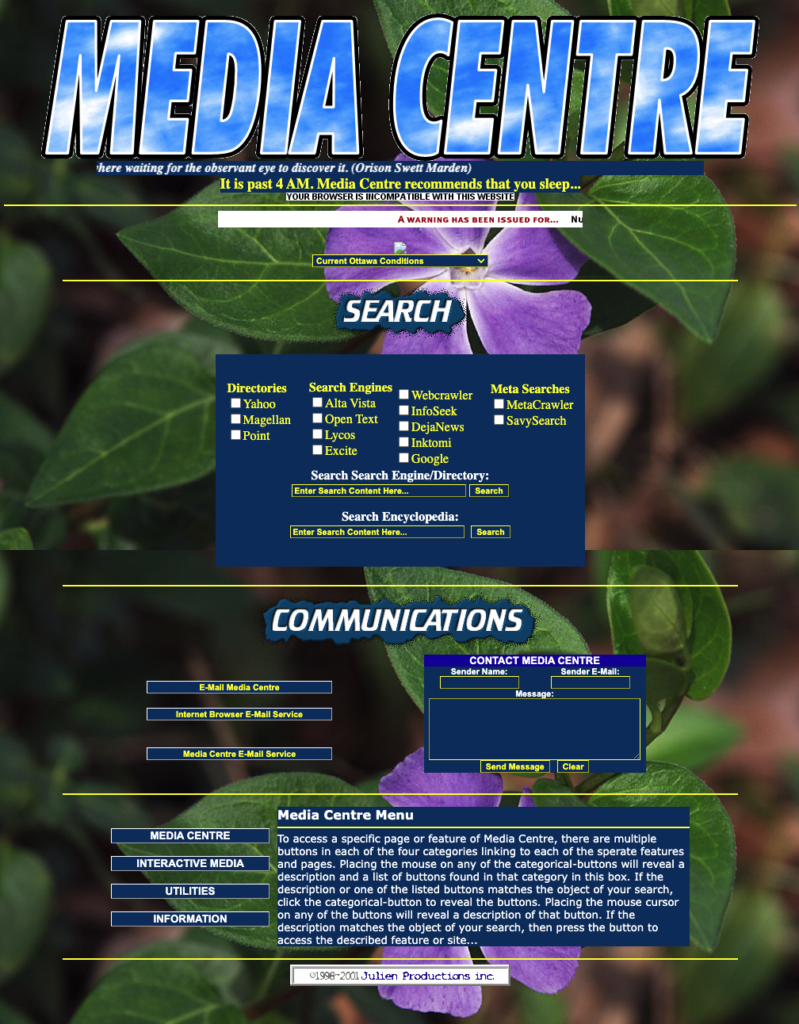My first website was around 2000-2001, when I had a presence on GeoCities. At the time, this was the most common way for someone to have their own place online, as this was before social media.

What would become this incarnation was put online in November 2003. For context, MySpace launched only three months earlier.
A lot has changed since this website has gone up for millennials:
- Music used to be listened to on CDs
- Spotify launched in 2008
- Movies watched in theatres or on DVD
- YouTube launched in 2005
- Netflix streaming launched in 2007
- Apple TV+ in 2019
- Games played on discs
- Steam launched in September 2003
- Books were physical
- Kindle first came out in 2007
- Maps were on paper
- Google Maps launched in 2005
- Programs were listened to on radio
- The term “podcast” was coined in 2004
- There was no contactless payments
- You needed to sign a receipt if you paid by credit card
- A lot of smaller places were cash-only
- There was no self-checkout
- Cashiers handled every transaction
- Other jobs – like handling payroll – had dedicated people
- There was no billion-user social media
- MySpace peaked at 300M users in 2007
- Facebook launched in 2005
- Tumblr in 2007
- Instagram in 2010
- Snapchat in 2011
- TikTok in 2016
- There were no apps or infinite scrolling or cellphone addiction
- iPhone launched in 2007
- You ordered cabs with a phone call
- Uber launched in 2009
- You stayed at hotels
- Airbnb launched in 2008
- Payphones were a common way to place phone calls on the go
- Cellphones were only starting to pick up, and could only call and text
- Banking was done via ATM or with a bank teller
- Cashing a cheque couldn’t be done via app yet
- Cheques were the most common way to transfer money
- e-transfer launched in 2003
- At work, conversations were in-person or via call
- Slack launched in 2014
- People still sent letters
- E-Mail was a thing, but most companies would communicate to you via letters, and some acquaintances as well
- Bills came in the mail
- CRT televisions / monitors were the norm
- Light bulbs were predominantly incandescent
- LED light bulbs hit the market in 2009
- Buses didn’t report their position with GPS
- You consulted a schedule to know when it was expected to show up
- You consulted a map to know which streets routes operated on
I focused on millennials for the above because for the elderly, my parents’ generation now, they largely do things as it was done in 2003. I don’t think they’d attempt using a self-checkout, tap to pay, navigate by GPS, subscribe to a streaming service, etc.
Other changes since 2003 include the cost of living:
- Average home price in 2003 was $220,000
- In 2023, it was $745,000
- Median income in 2003 for 35-44 year olds was $45,200
- In 2021, it was $57,000 for the same age group
- The Great Recession of 2007-2008 would depress Millennial wages for a decade
- Some private-sector jobs still offered pensions
- Now at best the company might contribute a single year’s worth of income to your RRSPs over 30 years – if job security weren’t similarly a thing of the past
And the matter of rights:
- Same-sex marriage was not yet legal across Canada
- First jurisdiction was Ontario in 2003; across Canada in 2005
- Trans people had to have surgery, even if they didn’t want it, to update legal documents – and surgeries weren’t covered in Ontario
- CAMH was practicing conversion therapy on trans youth until 2015
- Employers were firing staff for being gay or trans in greater numbers
There was a physicality, and inherent slowness, that existed in 2003. What we do now is broadly the same, but this is accomplished is completely different, bequeathed to software. I’m not only talking apps; but products invisibly eliminating careers altogether and substituting them, if at all, with lower paying precarious alternatives. Similarly, those careers that remain face downward pressures on job quality, that is, unless they are in the business of contributing to those downward pressures for others.
My 2003 self was optimistic for the future.
My 2023 self has a more complicated outlook.